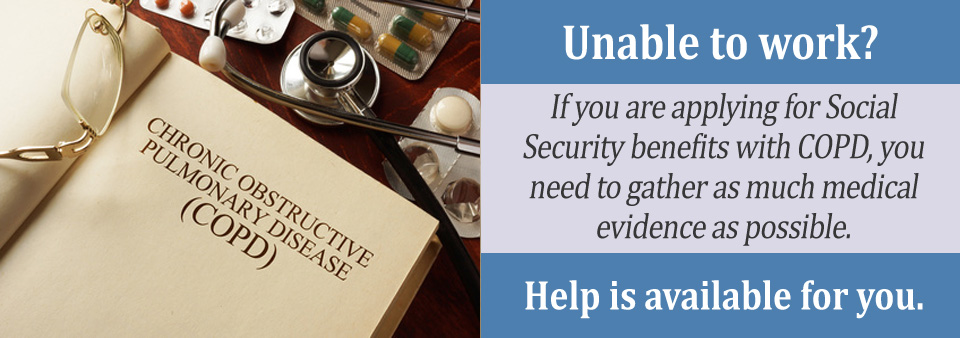As a potentially debilitating lung disease, chronic obstructive pulmonary disease (COPD) triggers severe breathing difficulty. Mucus builds up into the lungs, and if left untreated, the disease can develop into life threatening ailments such as heart disease and lung cancer. Patients that suffer from chronic COPD are unable work and thus, lose the financial support they need to provide for their families. Lost income and mounting medical bills can put a COPD patient on the brink of financial disaster.
Fortunately, the federal government offers a program called Social Security Disability Insurance (SSDI), which bridges the financial gap caused by chronic cases of COPD.
Qualifying for SSDI Benefits
If you suffer from COPD, and the medical condition prevents you from going to work, then you might be eligible to receive SSDI benefits. Managed by the Social Security Administration (SSA), SSDI represents a program that is funded through payroll taxes. To qualify for SSDI benefits, you must have stopped working for at least one year or have received a diagnosis for a terminal illness. The SSA refers to strict criteria to determine eligibility for SSDI Benefits.
You need to have worked in a job that meets that standards set forth by the SSA. In addition, you need to meet the guidelines published in the SSA Blue Book, which lists the diseases and symptoms that qualify applicants for SSDI benefits. Meeting the second criterion of suffering from a medical condition that prevents you from working is the most difficult criterion to meet. The SSA thoroughly reviews SSDI applications to determine whether the evidence presented qualifies applicants for financial assistance. Cost of living adjustments ensure SSDI recipients maintain the same earning power. Your family is eligible to receive Social Security retirement and survivor benefits to help meet expenses.

How Does the SSA Treat Medicare Benefits?
There is a cross section of Americans that receive SSDI benefits and meet the age requirement to start receiving Medicare health care coverage. The question is can Americans receiving SSDI benefits and get taken care of by Medicare health insurance? The answer is yes, with one restriction. You must wait 24 months after receiving SSDI benefits to qualify for Medicare health insurance coverage. Let’s say you have just turn 65 and you receive SSDI benefits. You must wait until you turn 67 to become eligible for Medicare. During the two-year waiting period, you can enroll in a health insurance plan that is offered by a former employer.
Making the Transition Back to Work
The primary goal of the SSDI program is to ensure disabled workers have the financial resources to address a debilitating disease or illness. Many disabled Americans eventually recover from the severity of their symptoms, which makes them eligible to return to work at least on a part time basis. To help formerly disabled American workers get back in the work groove, the SSA offers two works transition programs called Ticket to Work and Plan to Achieve Self-Support (PASS). Both programs direct SSDI recipients to employment resources, as well as help recipients save money to conduct job searches.
To discover the strength of your SSDI benefits application, you should receive a free case evaluation. Not only does a free case evaluation give you an idea about the strength of your application, it also provides you with insight on how to present a more persuasive case. Contact a Social Security lawyer to schedule a free case evaluation.